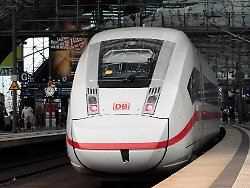Friday, October 1st, 2021
Update
Prices rise in long-distance transport
Train travel will be more expensive in December
Rail customers have to be prepared for more expensive tickets in long-distance transport. With the timetable change on December 12th, Deutsche Bahn will increase prices by an average of 1.9 percent. The company emphasizes that the increases are “well” below the inflation rate.
Deutsche Bahn is increasing fares. They rise on December 12 by an average of 1.9 percent, as the company announced. Tickets at the so-called super saver price and saver price will be available unchanged from 17.90 euros and 21.50 euros respectively. On the other hand, the flex price and the prices for route season tickets will rise by an average of 2.9 percent. Bahncards are also 2.9 percent more expensive.
The railway spoke of a moderate price adjustment and pointed out that general inflation is currently 4.1 percent. “In a long-term comparison, rail travel remains cheap,” emphasized the company. Even after the price increase in December, a long-distance journey costs about as much as in 2012. For Bahncards 25 and 50 it is the first increase in seven years. The price premium, averaging 1.9 percent overall, is the highest since 2012. After that, there were also some zero rounds. In 2020, long-distance transport prices fell by ten percent after the federal government cut VAT. This should encourage more people to take the train instead of getting into a car or plane.
The Federation of German Consumer Organizations criticized
The state company is doing badly financially. In addition to problems in international business and in freight transport, the corona crisis was a heavy burden. In the first half of 2021 alone, the highly indebted group posted a loss of 1.4 billion euros. Nevertheless, the goal remains to double the number of long-distance passengers by 2030 compared to 2015. This should help Germany achieve its climate goals in transport. In return, billions flow into trains, the rail network and additional employees. The railway has not yet announced a price increase in regional transport for this year. There, however, the railway only makes the prices for trips outside of transport associations, which affects around every fifth customer trip.
There was criticism from the Federation of German Consumer Organizations (vzbv). “The announcement by Deutsche Bahn that it is going to turn the price screw again gives the impression that the board of management is completely losing sight of customer satisfaction,” explained vzbv boss Klaus Müller. “Especially those who are loyal to Deutsche Bahn with season tickets, BahnCards and Flextickets will be punished by the significant price increases.” Climate protection and price increases for rail travel contradict each other, complained Müller. A future “climate government” must stop the significant price increases.
No 3G rule on long-distance trains for the time being
Furthermore, there will probably be no 3G rule on long-distance trains for the time being. Such a regulation, which would only allow vaccinated, convalescent and tested people to drive, was “neither legally possible nor practicable,” said the Ministry of Transport. The ministries involved within the federal government came “unanimously” to this conclusion. “There is no legal basis for 3G in trains,” the ministry said. “In addition, the control of such a measure would run counter to an effort that would not justify the benefits.”
Chancellor Angela Merkel was one of the advocates of a 3G regulation in long-distance rail transport during the discussions over the past few weeks. Your spokesman Steffen Seibert referred to a current “stabilization of the corona numbers at a slightly lower level”. Against this background, the federal government is “currently not pursuing the introduction of 3G in long-distance trains”. However, if the pandemic situation worsened significantly in autumn or winter, “it would of course be the responsibility of the federal government” to examine further measures again, added Seibert. This applies regardless of whether the federal government is still in office or a new one.
